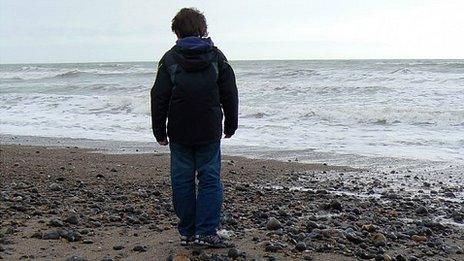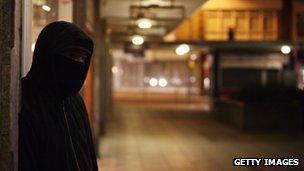How to rebuild a troubled 12-year-old
- Published

Being taken into custody or care can be the the end of the road for out-of-control teenagers. But new hope is being offered to some of the UK's most troubled youngsters with a pioneering, intensive family-based therapy programme.
Kane, raging with anger, hovers over his father, a chair raised high. He appears to have every intention of smashing it down. Kane is a threatening figure. He is also 12 years old.
As his therapist Amanda Singh calms the situation, Kane's mother, sitting in the living room of the family home, looks on in horror.
Kane and his family are in the middle of an intensive therapy session, part of the multisystemic therapy programme (MST) that was offered to Kane and his parents after he was sentenced by the court for anti-social behaviour. He was also found to be frequently smoking cannabis.
His parents are Bangladeshi and his father works long hours in a restaurant near their London home. His older sister is doing well at school but when Kane started staying out late, smoking cannabis and missing school, the family's life turned upside down.
Kane has now signed up for the MST programme, which offers family-based interventions for 11 to 16-year-olds to address their problem behaviour.
MST was developed in the US as an alternative to custody for young, repeat offenders. It revolves around improving parenting, increasing education and training, reducing offending behaviour, and tackling underlying health or mental health problems including substance misuse.
Kane's family is just one of a number with similar problems on a UK pilot scheme.
But the 12-year-old is not happy with his new regime. "Now my parents have me like locked down. It's like a prison but I'm doing it," he says. "The contract is unfair by stopping me going out altogether and banning some of my friends.
"You get punished constantly for five months - even when you're doing well. The contract is 24/7 so you don't get time off from it even when you're following it."
Singh gets involved in every aspect of the youngster's life, bringing together his family, school and even the families of his friends to try to stop a seemingly inevitable slide towards further criminality and imprisonment.
"We spend months working intensively with families knowing that this kind of intervention can literally shape lives," she says.
"We have long been using multisystemic therapy with teenagers, but what sets the work with Kane apart is that MST combines home drug-testing and a system of rewards and penalties aimed at achieving complete abstinence from drugs by the end of treatment."
The violent outbursts are not just confined to the home, as Kane frequently erupts at school.
"Kane is involved in some fairly aggressive incidents here and I think most of his anger comes from the fact that he's smoking so much cannabis," says one of his teachers.
"I saw him react the other day in class and thought straight away - you're stoned. And it isn't just him, there are a number of pupils where this is a daily part of life from year eight onwards."
Another teacher who has witnessed one of Kane's many classroom incidents says the youngster appears to be extremely defensive when challenged.
"I saw the change in him. He stood up straight, looked her [the teacher] right in the eye and that's when he started swearing. It triggered him to change like that. So I think it's just he's very defensive straight away. Very, very defensive."
Singh has been working with Kane's parents to help them work on wresting back the control she believes has been ceded to Kane. One of the first things they had to do was draw up a behaviour contract.
"Kane is effectively running things at home, easily dividing his parents, causing their allegiances to shift during arguments, often resulting with the parents turning on each other," Amanda says.
"The contract lays down clear expectations."
Kane's mother agrees.
"My life's come to a standstill until I get him some sort of control. I do function but I'm not going anywhere.
"All I know is this is a problem and I need to get some sort of control over it."

MST is believed to drastically cut reoffending rates in youngsters
Singh teaches Kane's parents to deliver consequences - even under severe provocation - if Kane breaches the contract.
On one occasion when Kane's mother had been alerted to the fact that he was skipping school, she calmly explained to him that he had broken one of his pledges and was not allowed to use the internet.
Kane reacted angrily, directing a torrent of abuse and threats at his mother. But she stood firm and Kane was not allowed online.
Kane's parents and teachers believe many of his behavioural problems stem from his heavy cannabis use.
"I can do 15 joints a day if I have it," says Kane.
"At first it started with cannabis because I was chilling with me mates. They were older than me and you feel more popular. Cannabis was part of it, meeting up for a smoke."
Kane is given the choice of being tested for drugs at home, but if he refuses, he will be penalised.
Although Kane is making progress and smoking less cannabis, his struggles continue.
"I still have respect and do want to obey my parents but it comes to a point where they don't see it from your point of view," he says.
Having helped other children with this approach, Singh is realistic about possible outcomes.
"We aren't looking for parents to change a lot, but small adjustments can bring great benefits," she says.
"It is about changing negative patterns. For at least two years, Dad's main interaction with Kane had involved fruitless attempts to discipline him.
"Working with the family means putting in place closer relationships and this is something that's definitely helped in Kane's home," Amanda concludes.
With support from all around him, Kane is hopeful of a better future.
"I think this has been good for my family. Things are better at home, less arguments and stuff," he says.
"People say I won't stick to it. But I don't think about what those people say, I think more about myself and how it might benefit my family if I stick with it."
Part one of <link> <caption>The Trouble with Kane</caption> <url href="http://www.bbc.co.uk/radio4/programmes/schedules/fm/2012/05/14" platform="highweb"/> </link> is on Monday 14 May at 20:00 BST on Radio 4 or catch up on iPlayer (UK only) via the link. Part two follows on Monday 21 May.